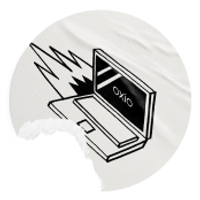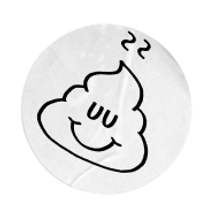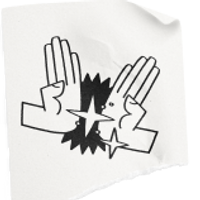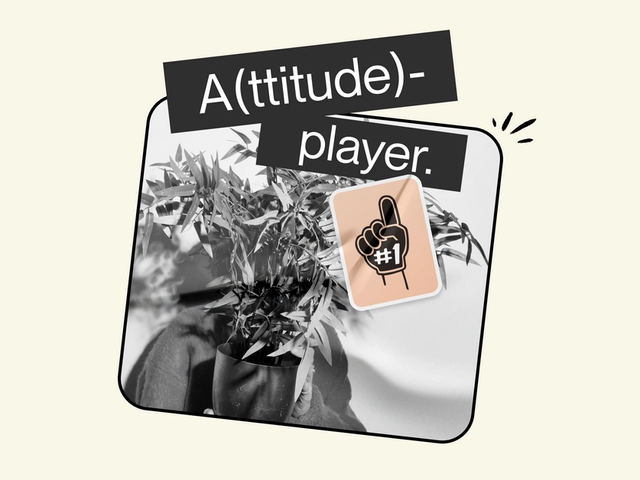
This is an internal document. This article is a copy of what our teammates get when they start with oxio.
TL;DR
An A(ttitude)-Player at oxio is someone who is:
- On a positive trajectory when it comes to their technical skills.
- Capable of being empathetic and is open to new perspectives.
- Comfortable enough in their own skin to have the courage to be humble.
- Daring, outrageously curious & open-minded.
- Open to receiving & giving feedback wholeheartedly.
- Willing to embrace failure and understands that getting things wrong is a part of the growth process.
- Self-aware. Know thyself. Know thy value. Know thy limits.
- Intellectually honest. Can analyze diligently, ask thoughtful questions, share their learnings and self-correct.
- A driver. Aka has some skin in the game.
Introduction.
Last February, I posted this on Slack.
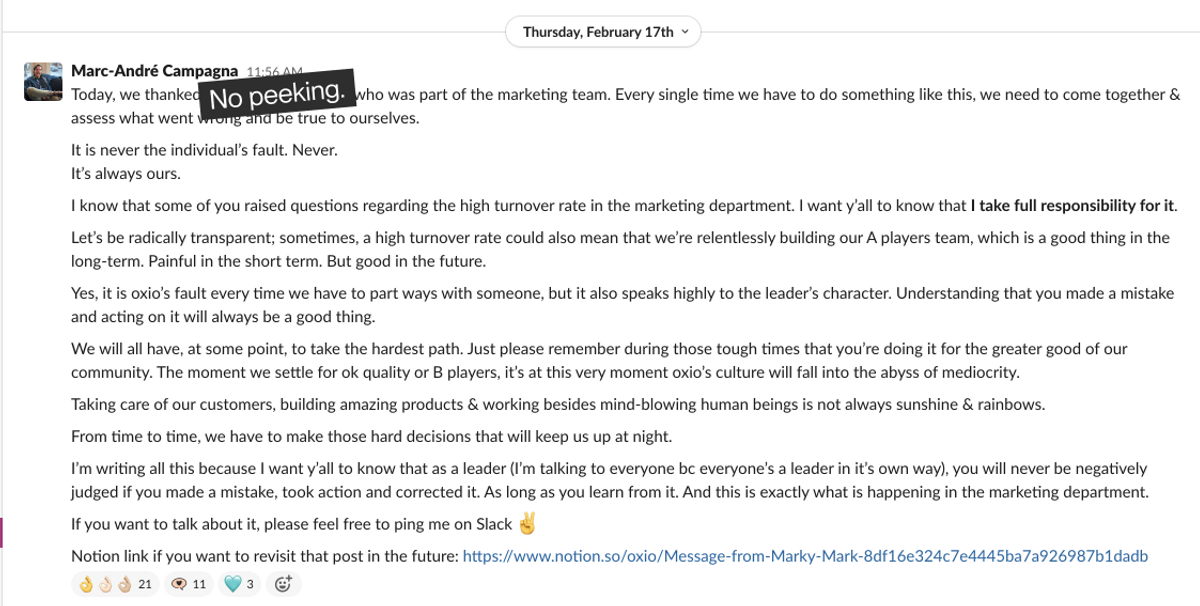
After that post, someone whom I believe is a true A-Player, reached out to me. He told me that reading this post made him uncomfortable because he didn’t understand what an A-Player meant. I felt like I had been slapped in the face. I thought to myself, how the hell could an A-Player feel inadequate?!
It was at that very moment that I looked straight into the void of my own ignorance: I couldn’t put words to really describe what an A-Player was. I’ve been using it like a drug addict uses cocaine since I read No Rules Rules 2 years ago. I was trying to sound smart, but I was struggling to define what it was when asked. Look at you Marc, all foam no beer.
Clearly I needed to change. I needed to figure out what an A-Player at oxio is. I needed to write about it. Define it. Explain it. Make it make sense
So, in this essay I’ll take a stab at defining the characteristics we’re looking for in A-Players at oxio. And if it all works out, it will enable behaviours and values that serve our community’s purpose & mission.
LFGGG.
What’s an A-Player?
‘A’ stands for attitude not aptitude.
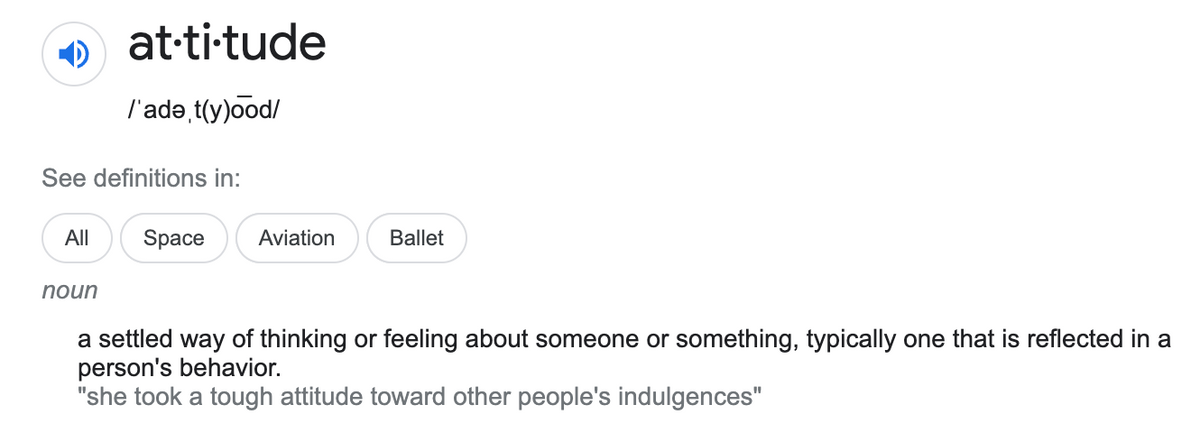
So I know I just said that “A stands for attitude not aptitude.” but, we need to spend a minute talking about aptitude to better understand why attitude is so damn important for oxio.
When it comes to aptitudes, our baseline at oxio is simple: you need to be great technically at what you do. But, as the enlightened Meek Mill1 would say: there’s levels to this shit. And defining it isn’t that easy. For example, how do you compare the technical skills of a software engineer who just got out of college with one who has been working since the dot com bubble?! Yea, like I said, there’s levels to this shit.
Another example. How could you compare me, to say, the hall of fame entrepreneurs like Tobi Lütke, Charlie Munger, John Malone, Mark Leonard, Dee Hock, Rick Rubin and the Collison’s brothers? There’s definitely a case to be made that I shouldn’t even be allowed to mention them in the same article as me.
So, what we try to do is track the trajectory of the technical skills of an individual, no matter what their starting line is. If your trajectory is positive, and you’re improving every year, good. If not, you’re not a ‘technical’ A-Player. It’s all about the growth mindset, which I’ll talk more about later on.
Okay, now that you’ve checked the aptitude pre-requisite, let’s talk about attitude.
And who knows attitude best? Salt-N-Pepa2. Obviously.
Let’s talk about attitude, baby
Let’s talk about what we’re looking for in you and me
Let’s talk about all the good things
And the bad things that may be 🎶
We put a lot of emphasis on attitude because we believe it is one of the most critical parts to the well-being of the oxio community we’re building.
Let’s say we imagine oxio as a network, we are a connectivity platform after all. And all the people working for oxio are nodes in the network. The nodes connect, receive and send data to each other. The interaction between those nodes is what makes the network valuable. You isolate a node, and it doesn’t create value. But, if all of them are working well together, they become far more valuable than the sum of their parts.
That’s why we focus on attitude. You make up the nodes in the network. Your attitude determines how well you’re going to fit, send and receive data. And that’s where the value gets created.
Outstanding attitude is one of those rare things that, when shared, it multiplies.
Up next: let’s take a look at the attitudes that are essential to becoming an A-Player at oxio.
Care & Be Empathetic.
Out of the lumber of things we are taught, the gravel and cement of our experience and the nails of the things we observe, we slowly erect an edifice, an unconscious, internal temple of reality, gradually filling it with the furniture of habit, custom, preference, belief and bias. We get comfortable there. It's our sanctuary. Through its windows, small though they may be, we view society and the world. Our internal model of reality is how we make sense of the world. And it can be a badly built place indeed. Even if it is well constructed, it may have become archaic. Everything that gave rise to it may have changed. Society and the natural world are never stagnant. They are constantly becoming.
It is our individual perspective, the view from our internal temple of reality, that constantly discolours and distorts our perception, blinding us to how things might become, or conceiving of how they ought to be. When everything changes around us and it becomes necessary to develop a new perception of things, a new internal model of reality, the problem is never to get new ideas in; the problem is to get the old ideas out. Every mind is filled with old furniture. It's familiar. It's comfortable. We hate to throw it out. The old maxim so often applied to the physical world, "nature abhors a vacuum," is much more applicable to the mental world. Clear any room in your mind of old perspectives, and new perceptions will rush in. —Dee Hock, One From Many, VISA and The Rise of Chaordic Organization3
Empathy is one of our core values at oxio. The great gift of human beings is that we have the power of empathy. We think that it is one of the most potent forces for change. Put yourself in other people’s shoes and try to look at the world from their point of view. If you had their life experiences, you’d probably think the same as them. Expand your vision of the world by understanding others.
A great corollary effect of empathy is gaining a new perspective.
Let’s be honest, I’m sure that every week or so you catch yourself unintentionally thinking that someone made a dumb mistake (I sure do). But, question that first reaction. Every single time this happens to me, I try to go out of my way to talk to the person and understand what went wrong. 99.999% of the time, when I understand what happened from their perspective, it’s not so dumb anymore—I had, again, just jumped to an unfair conclusion too quickly. Who’s left being the dumb one now?!
Please, please, please give a damn. Clear your mind, listen to others and welcome new perceptions.
Be Humble.
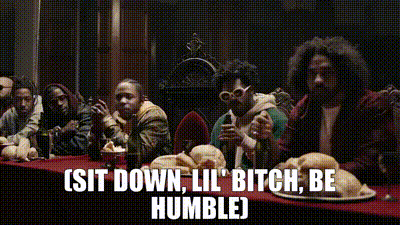
If ego is the voice that tells us we’re better than we really are, we can say ego inhibits true success by preventing a direct and honest connection to the world around us. One of the early members of Alcoholics Anonymous defined ego as “a conscious separation from.” From what? EVERYTHING. —Ryan Holiday, Ego is the Enemy4
As my good old friend Kendrick Lamar would say, ‘sit down, be humble’ (by now you’ve probably figured out that I wore XXXL’s tees in high school and revered Prodigy).
If you think about our history for a second, oxio was born out of a series of humbling experiences. From failures on top of failures with Accès Télécom (starting with the name), oxio rose from it to become what it is today.
If we had consciously separated ourselves from the failures that were happening right in front of us during that time, aka let our egos get in the way, blaming others and telling ourselves that it wasn’t our fault, the company would be 6 feet under by now.
Instead, we realized that we didn’t know sh*t and rolled up our sleeves to try and understand what was really happening. Most of the time, you won’t know for sure what the root cause of the problem at hand is, but being humble enough to know that you don’t know will open your mind to the right attitude. And once you’ve got the right attitude, you can start thinking iteratively and figure out what’s really going on.
BTW, I’m not telling you this to show you how awesome and humble Francis (aka my beloved co-founder) & I are. I’m writing this to remind me and you to stay humble. And if I’m being honest, it was pretty easy to be humble at that time. When you get hit every single day by a near-death experience, being humble just happens. And that builds your character. I even have a pretty amazing story about a bear and getting naked. I’ll write a blog post about it when we get 100,000 customers. Promise.
All this to say: be humble. I’m not saying to shy away from that beautiful confidence of yours. Like Holiday said: To me, being humble is having a direct and honest connection to the world around us. Be confident. Stay humbly connected.
If we live that way, we’ll be eternal students. Absorbing the weird data that the entropy of the world throws at us. We’ll have the right toolbox to really understand what our next move should be. And if it doesn’t work, well, we’ll just rinse & repeat 🔁.
So, sing with me now: ‘sit down, be humble 🎵’...
Be Curious & Open-Minded.
Kids are curious, but the curiosity I’m talking about is shaped differently than kid curiosity. Kid curiosity is broad and shallow; they ask why at random about everything. In most adults this curiosity dries up entirely. It has to: you can't get anything done if you're always asking why. But in ambitious adults, instead of drying up, curiosity becomes narrow and deep. The mud flat morphs into a well.
Curiosity turns work into play. For Einstein, relativity wasn’t a book full of hard stuff he had to learn for an exam. It was a mystery he was trying to solve. So it probably felt like less work to him to invent it than it would seem to someone now to learn it in a class.
If you want to do good work, what you need is a great curiosity about a promising question.
Find a question that makes the world interesting. People who do great things look at the same world everyone else does, but notice some odd details that’s compellingly mysterious.
Your life could be shaped by your own curiosity. It is for all ambitious adults. —Paul Graham, What You’ll Wish You’d Known5
I experienced firsthand internet connectivity issues when I was living in rural Québec with my parents. Since then, I’ve been OBSESSED with this question: How can we help make connectivity seamless & accessible across the world?
oxio is a manifestation of that. If we’re successful, oxio will go through many iterations. But, we’ll always be trying to answer that question. I’ve been diving as deep as I can since 2017, and y’all have joined somewhere along the way, but we’ve just barely scratched the surface.
The answer we leave the world will be oxio’s legacy.
And you, what’s your life’s work gonna be? Are the big questions you’re asking yourself aligned with THE question we’re trying to answer at oxio? If yes, amazing, you’re in the right place. If not, maybe you need to self-correct your path and look elsewhere.
If you haven’t found your question just yet, don’t worry. It’s fine. But don’t settle until you’ve found what really interests you. Experience the world (whatever that means to you) and take the time to find what you’re really curious about. And by the way, we’ve set-up oxio’s culture to encourage this. Read more about thatin our People Handbook (i.e; we pay for books & we encourage everyone to take the time to live).
Crave Feedback.
A good feedback system is an absolutely critical aspect of a functioning organization. At a macro level, when companies don’t do feedback well, pockets of disagreements within organizations grow, causing resentment, distrust, and ultimately organizational failure. At a micro level, feedback is the only way to achieve true personal growth. You are not objective enough about yourself to grow effectively without external feedback. —Alex MacCaw, The Manager’s Handbook6
(First things first, you can find our foundation on how to give & receive feedback)
Just a week ago, I had a heartfelt conversation with Jerr (not your typical, but our very own CFO/COO), which turned into a 4+ hours feedback dinner. On top of being time-consuming, it was tough, painful and stressful. But, on my way back home, I couldn’t help but feel a deep sense of gratitude. I’m so grateful to be working alongside a person who dares to tell me what he really thinks. It shows that he cares. A lot. Just like I do. He also shined a light on some blind spots that I had about myself that I would never have discovered alone. He made me more self-aware.
Jerr has helped me become a better person and I thank him for it. It’s because of moments like that that I now really crave feedback. And I hope you do too.
It’s an art to give and receive feedback and like any craft if you want to achieve mastery, it needs to become a daily practice.
Embracing Failure = Growth Mindset.
Now think about the Growth Mindset: it’s about being able to see failure in a clear-eyed way; not as an indictment of one’s judgment, but as a learning opportunity.
Evolution is driven by failure. But if we give up when we fail, or if we edit our mistakes, we halt our progress no matter how smart we are. It is the Growth Mindset fused with an enlightened evolutionary system that helps to unlock our potential; it is the framework that drives personal and organizational adaptation.
...
‘The history of science, like the history of all human ideas, is a history of...error,’ Popper wrote. ‘But science is one of the very few human activities—perhaps the only one—in which errors are systematically criticized and fairly often, in time, corrected. This is why we can say that, in science, we learn from our mistakes and why we can speak clearly and sensibly about making progress’.
But the basic point that scientific theories should be testable, and therefore vulnerable, is almost universally agreed upon. Self-correction is a central aspect of how science progresses.
It is about the willingness and tenacity to investigate the lessons that often exist when we fail, but which we rarely exploit. It is about creating systems and cultures that enable organizations to learn from errors, rather than being threatened by them.
Failure is rich in learning opportunities for a simple reason: in many of its guises, it represents a violation of expectation. It is showing us that the world is in some sense different from the way we imagined it to be. —Matthew Syed, Black Box Thinking7
The evolution of oxio is no exception. oxio is a series of successful business failures.
We started as Accès Télécom, with the idea of solving internet speed issues for a Total Addressable Market (TAM) of 333 potential customers (the beautiful city of Rivière-à-Pierre). Through iteration, a lot of messiness and sleepless nights, today the whole world is our TAM.
We thought things through, we tested, we failed (a lot!) and self-corrected our way to where we are today. Boy, oh boy was it messy. It may seem easy to look back, connect the dots and build a linear, coherent narrative. But it couldn’t be further from the truth.
And believe me, the future won’t be any different. We’ll fail as much, if not more, and the survival of oxio will depend on our ability to self-correct our way in the right direction.
We need to reinforce that collective muscle to learn together and build that collective intelligence. Our survival depends on it. And like Harry Myers said in Human Engineering8, “you must learn from the mistakes of others—you will never live long enough to make them all yourself.”
I can’t stretch enough how critical it is to build a community that understands the importance and thrives on learning together from failure, just like the scientific community has done.Our first attempt at building our collective muscle are our wisdom nuggets. It’s where we record our successes, failures and learnings from our initiatives.
Our survival depends on it.
Be Self-Aware.
One might say that the ability to evaluate one’s own ability is the most important skill of all. Without it, improvement is impossible. And certainly ego makes it difficult every step of the way. It is certainly more pleasurable to focus on our talents and strengths, but where does that get us? Arrogance and self-absorption inhibit growth. So does fantasy and “vision.”
In this phase, you must practice with a little distance, cultivating the ability to get out of your own head. Detachment is a sort of natural ego antidote. It’s easy to be emotionally invested and infatuated with your own work. Any and every narcissist can do that. What’s rare is not raw talent, skill, or even confidence, but humility, diligence and self-awareness.
For your work to have truth in it, it must come from truth. If you want to be more than a flash in the pan, you must be prepared to focus on the long term.
We will learn that though we think big, we must act and live small in order to accomplish what we seek. Because we will be action and education focused, and forgo validation and status, our ambition will not be grandiose but iterative—one foot in front of the other, learning and growing and putting in the time. —Ryan Holiday, Ego Is the Enemy9
If being humble is the recipe to be honestly connected to the rest of the world, being self-aware is the key to being able to act from that new piece of information.
If you can’t see things as they really are, can you really fully appreciate how the effect of that “thing” relates to you? How does it translate into you experiencing the world? How do you make people feel when you talk a certain way? What do you know for a fact? What is a feeling that could be biased? What are your strengths and weaknesses? What do you like? What don’t you like? I could go on and on about the kind of questions you should be able to answer about yourself.
Working in a team centric environment like oxio, if you want to be an A-Player, you have to be self-aware. If you’re not, you won’t learn which building blocks you’re contributing to, which ones you’re not, and also which ones you are detrimental to. Our environment is complex and you have to know where you fit in to be a positive force.
A simple example that happens often where we’re seeing a direct improvement correlation when self-awareness comes into play is: presenting tics. If no ones ever been pointed out that you touch your hair or face, or that you always licking your lips when presenting, there’s a good chance that you’re not even aware of it. But, the moment you realize it, or someone points it out to you, your next presentation will be tic-free.
Self-awareness enables you to self-correct instantly.
Intellectual Honesty: Analyze Carefully and Ask Thoughtful Questions.
Be slow in deliberation, but be prompt to carry out your resolves. The best thing which we have in ourselves is good judgment. Constantly train your intellect, for the greatest thing in the smallest compass is a sound mind in a human body. —Isocrates
Speed as a habit10, mixed with intellectual honesty, is the ultimate weapon in business. Both of these attributes must coexist to deliver outstanding results. One cannot serve as an excuse to not consider the other.
I believe that we’ve put enough emphasis at oxio on ‘speed as a habit’, most people in the organization are aware of the concept and it’s even a mandatory read during the onboarding process.
I just realized recently that sometimes shortcuts can slow you down. Hence, I don’t believe we have put the same emphasis on intellectual honesty. And we should. We’re fans of the “move fast, break things” motto when we should be fans of “analyze diligently, leave no rocks unturned to discover your own blindspots and then, only then, move fast and break things”. It’s less punchy, but way more accurate.
Implementing the Working Backwards11 method was a good step in that direction, but we still have a long way to go.
Frank Slootman, in Amp it Up12, explains it in a beautiful way, so I won’t even try to take a shot at it and I’ll just paste it here:
We tend to be “solution centric”—we spend most of our time discussing solutions rather than diagnosing problems. We race to conclusions about what’s wrong and what to do about it. We pattern match, reacting to situations based on our individual experience rather than studying the specific situation in front of us from a broader perspective.
Part of the problem is usually intellectual laziness. Your own frame of reference may lead you to a highly selective subset of the range of possible explanations. We’re naturally drawn to certain narratives, and we resist others. Politics enters the equation when certain narratives make people look good or bad. Sometimes entire companies are prone to thinking in terms of well-worn patterns, and it’s not expedient to deviate from the conventional wisdom. Winning the argument becomes more important than being correct in your analysis.
How can you get good at doing rational analysis before jumping to conclusions and train your people to maintain intellectual honesty?
My preferred tactic is to start with so-called first principles. Break problems down into their most basic elements. Ignore what you think you already know, and imagine you are facing this kind of situation for the first time in your life. The more you have seen, the harder this tactic gets, but it’s worth the effort.
In meetings, I often object to presentations where 90% of the content is about the solution, not the problem. My co-workers find it frustrating that I always want to walk back to the beginning rather than rubber stamp a program or project. They want to jump right into the action phase, so they see in-depth discussion about possible explanations as a waste of time. Of course, when you end up being wrong about the problem and therefore ineffective, that’s a much more serious waste of time. Once you start examining and pulling a problem apart, the perspective often changes the range of possibilities. That often prevents a mistake that would have forced us to backtrack later on—wasting time, effort, and money in the process.
So, take your time to meet new people who are knowledgeable in what you’re looking into, ask good questions, analyze carefully & write your analysis so you can share with the team before you start rushing to conclusions. Involve the team and be open to different perspectives. Once you’ve reached a conclusion worth pursuing, move fast & break things.
Be a Driver.
On the road of life there are passengers and there are drivers. Drivers wanted. —Frank Slootman
Frank Slootman, again. He explained the concept of ownership through this driver metaphor and it’s so damn good that I’ll just share it with you:
Passengers are people who don’t mind simply being carried along by the company’s momentum, offering little or no input, seemingly not caring much about the direction chosen by management. They are often pleasant, get along with everyone, attend meetings promptly, and generally do not stand out as troublemakers. They are often accepted into the fabric of the organization and stay there for many years.
The problem, is that while passengers can often diagnose and articulate a problem quite well, they have no investment in solving it. They don’t do the heavy lifting. They avoid taking strong positions at the risk of being wrong about something. They can take any side of an issue, depending on how the prevailing winds are blowing. In large organizations especially, there are many places to hide without really being noticed.
Passengers are largely dead weight and can be an insidious threat to your culture and performance. They inadvertently undermine the mojo of the organization. They sap the animal instinct and spirits you need in business to thrive.
Drivers, on the other hand, get their satisfaction from making things happen, not blending in with the furniture. They feel a strong sense of ownership for their projects and teams and demand high standards from both themselves and others. They exude energy, urgency, ambition, even boldness. Faced with a challenge, they usually say, “Why not” rather than “That’s impossible”. —Frank Slootman13
Please, be like Frank. Be a driver and search for drivers to populate your teams.
What Happens if You Realize Someone’s Not an A-Player?
I believe that people should be removed from their roles much more quickly for bad interpersonal behaviour than for bad business performance. We will work with people to improve their underperformance if their values and character are clearly on board with our culture. But treating colleagues or customers badly is a sign of a much more fundamental problem, not an inadequate skill set that can be improved with coaching. —Frank Slootman14
It is everyone’s responsibility to protect oxio’s culture. But, like Frank said (damn it Frank, how can I be an A-Player CEO when there’s CEOs like you living & breathing like it’s nothing on planet Earth?!), you should act much more quickly when it’s an attitude problem versus a bad business performance / technical skill issue.
We should always give a reasonable amount of chances to someone who deeply shares our values. But, we should never hesitate to act when we realize that someone’s not an A-Player— when we’re convinced that the person doesn’t embrace or have the set of attitudes we’re looking for. We have tolerance zero for this. When in doubt, reach out to Audrey (oxio’s head of HR), she’ll know what to do.
Conclusion.
All in all, have skin in the game. Be comfortable enough in your own skin to have the courage to be humble. Be ambitiously curious. Dare to do the research. Talk with others. Always ask questions so you can stumble on THE ONE that will keep you up at night. Don’t be afraid to follow your intuition if you believe there’s hidden value somewhere. Think from first principles. Make decisions that you would double down on every single day if you were the sole owner of oxio. Amplify the vision and make it your responsibility to share it to the rest of the team whenever you get the chance. When you’ll fail, and believe me you will, be self-aware enough to admit it, share your learnings and self-correct.
Aka give a damn.
You’re an A-Player? We’re Hiring.
If you’re passionate about the big question we’re trying to answer and you’re not part of our team. If you want to give me feedback or you believe there’s some things missing or simply things to improve. If you’re convinced you’re an A-Player. Well, I want to know you. Send me an email at marc@oxio.ca ✌️!
Written by Marc at the Maelström cafe, two oat milk latte’s and one cappuccino deep, while listening to Blue Coloured Mountain & Old Friends New Friends on repeat.
- Meek Mill - Levels Official Video
- Salt-N-Pepa - Let's Talk About Sex (Official Music Video)
- Publications — Dee W Hock
- "Ego Is The Enemy" by Ryan Holiday
- The Manager's Handbook
- The Manager's Handbook
- Black Box Thinking | Matthew Syed Consulting
- Human Engineerin - Harry Myers
- "Ego Is The Enemy" by Ryan Holiday
- Speed as a Habit | First Round Review
- Working Backwards
- Amp It Up
- The Outsider: How CEO-For-Hire Frank Slootman Turned Snowflake Into Software's Biggest-Ever IPO
- (ibid.)

